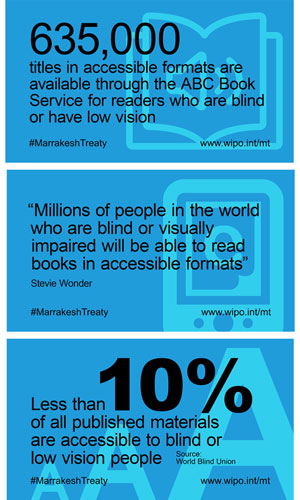Reflections on IP: An interview with WIPO Director General Francis Gurry
What has been the high point of your career at WIPO?
The fact that the Organization now has on board so many fine professionals who are collaborating across vertical reporting lines to develop and bring some of our best new ideas and projects to fruition. I don’t think there is anything now that does not require horizontal collaboration. It has been great to see that come together.
What has been your greatest achievement as Director General?
I think that is for others to judge. But for me, the Marrakesh Treaty and the Accessible Books Consortium (ABC) stand out. They successfully address a specific need and have the good will of all member states and relevant stakeholders. My colleagues have done wonderful work in building up the ABC Global Book Service, a repertoire of over 635,000 works in more than 80 languages, which is one of the key ways the ABC makes operational the legal framework established by member states in the Marrakesh Treaty. That has been a great exercise.
About the Marrakesh Treaty
The Marrakesh Treaty to Facilitate Access to Published Works for Persons Who Are Blind, Visually Impaired or Otherwise Print Disabled addresses the global “book famine.” It requires contracting parties to adopt national law provisions that permit the production of books in accessible formats, such as Braille, e-text, audio or large print, by organizations, so-called authorized entities, that serve people who are blind, visually impaired or otherwise print disabled. It also allows for the exchange of such accessible texts across national boundaries, without the need to request permission from the copyright owner.
The World Health Organization estimates that 253 million people are living with visual impairments around the world, with over 90 percent of them located in lower-income countries.
The Treaty was adopted on June 27, 2013, at a diplomatic conference organized by WIPO and hosted by the Kingdom of Morocco in Marrakesh. The Treaty entered into force on September 30, 2016, three months after it gained the necessary 20 ratifications or accessions by WIPO member states. The membership of the Treaty has grown rapidly since its entry into force in 2016. At the time of writing, the Treaty has 70 contracting parties covering 97 countries.
What enabled that success?
First, the Marrakesh Treaty and the ABC deal with a specific problem, which makes it easier to measure the impact and raise comfort levels around the proposed solution.
Adoption of the Marrakesh Treaty to Facilitate Access to Published Works for Persons Who Are Blind, Visually Impaired or Otherwise Print Disabled, Marrakesh, Morocco, June 2013. (Photo: WIPO/E. Berrod)
Second, they address a truly international problem. Thanks to the Marrakesh Treaty, it is now possible to produce just one accessible version of a publication in a given language and to make it available through the ABC Global Book Service, thereby eliminating the need to produce multiple accessible versions of the same publication in the same language for different countries. It’s a perfect example of an international solution that addresses an international need.
And third, the cause is indisputable. Nobody takes issue with enabling blind persons to have equal access to publications, which are the basis of the transmission of knowledge.
All three conditions rarely come together in this way.
About the Accessible Books Consortium

WIPO and its partners created the Accessible Books Consortium (ABC) in 2014 to help implement the objectives of the Marrakesh Treaty at a practical level. Less than 10 percent of all published works are produced in accessible formats according to World Blind Union estimates. To increase the overall number of accessible works that are globally available, the ABC works in three areas:
Capacity building – over 12,800 educational titles in national languages have been produced in accessible formats through funding, training and technical assistance provided by the ABC in 17 developing or least developed countries in the past five years.
Accessible publishing – the ABC promotes the production of “born accessible” works by publishers, that is, books that are...
To continue reading
Request your trial
